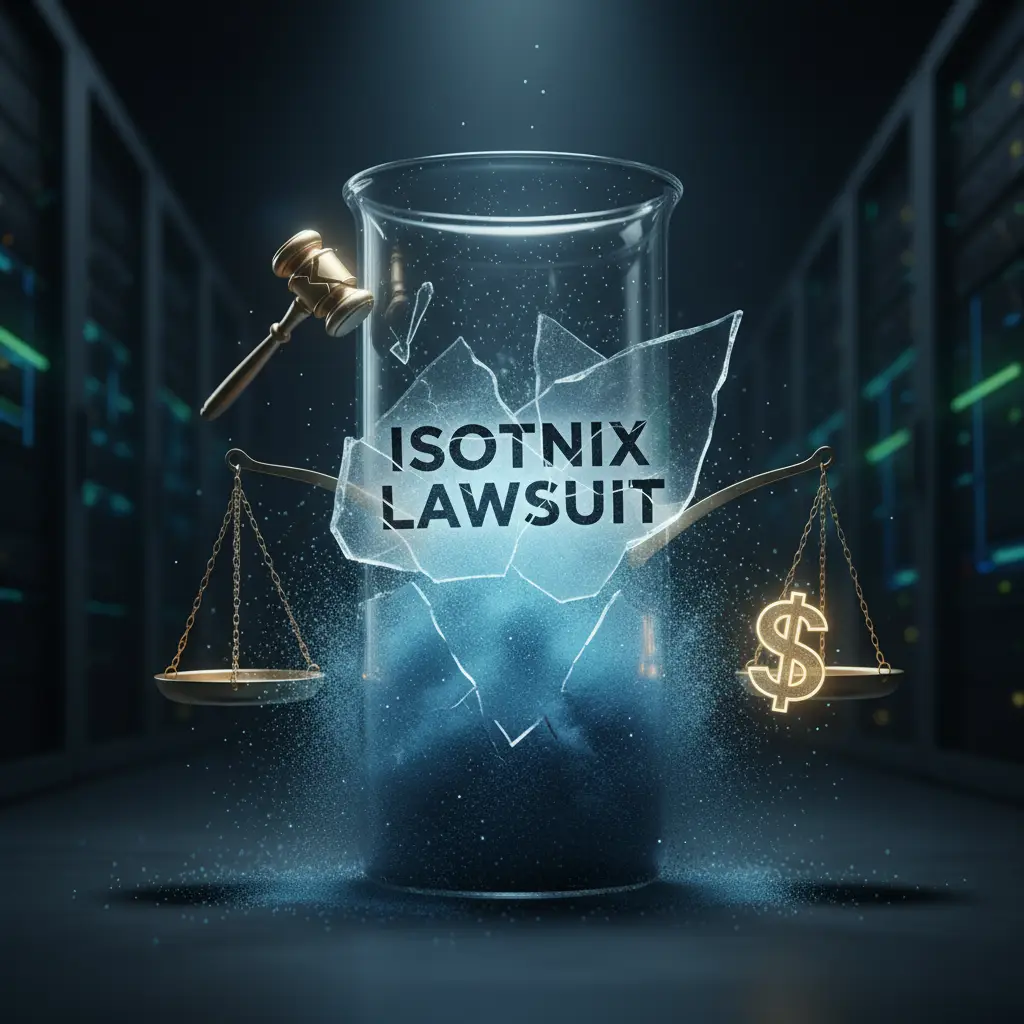Isotonix Lawsuit: What You Need to Know About the Controversy Behind the Supplements
If you’ve heard about the Isotonix lawsuit and feel unsure about what’s true, you’re not alone. Many people who buy or sell Isotonix supplements want clear answers. Here’s the quick truth: the lawsuit is about how these supplements were advertised and whether their health claims were really true. In this guide, we’ll explain what happened, why it matters, and how it affects customers and sellers in simple, clear language.
Understanding What Isotonix Lawsuit Really Is
Before talking about the lawsuit, let’s learn what Isotonix actually is.
Isotonix is a brand of powdered vitamins made by a company called Market America, started by JR and Loren Ridinger. These supplements are said to be “isotonic,” which means when you mix them with water, your body can absorb them faster than regular pills.
Market America says this makes Isotonix special and easier to use. But some experts disagree. They say faster absorption doesn’t always mean better health results. This difference between science and marketing became part of the reason for the lawsuits.
The Beginning of the Isotonix Lawsuit
The lawsuits against Isotonix started years ago. Most of them talked about false advertising, unproven health claims, or unfair promises made to sellers.
One big complaint said Market America made it sound like the supplements could improve health in ways that weren’t scientifically proven. Another said the company promised new sellers they could make lots of money but most didn’t.
So, the Isotonix lawsuits were not only about the vitamins themselves, but also about how they were sold.
What Sparked the Legal Issues
The legal problems began when customers and sellers started questioning Isotonix’s promises. They said:
- The health benefits were exaggerated.
- The studies used in ads were small or outdated.
- The company focused more on recruiting new sellers than selling to real customers.
Regulators began checking whether these actions broke consumer protection laws. Since supplements don’t have the same strict rules as medicines, companies have to be careful not to make false promises.
Table: Common Allegations in the Isotonix Lawsuit
| Type of Allegation | Description | Impact on Consumers |
|---|---|---|
| False Advertising | Claims about fast absorption without proof | Misleads customers |
| MLM Misrepresentation | Unrealistic money promises | Financial loss |
| Health Claims | Products advertised as “curing” illnesses | Legal trouble |
The MLM Model and Its Role in the Lawsuit
Market America uses an MLM model (multi-level marketing). This means people called “distributors” sell products and earn more money if they bring in new sellers.
Many people liked this idea at first but later said they lost money because they had to buy products and marketing tools. The lawsuit said Market America made unrealistic money promises, claiming anyone could make thousands of dollars a month but only a few did.
In many MLMs, only top-level members make steady income. Most others end up spending more than they earn.
The Science Behind Isotonix Lawsuit Claims
The main question is: Do Isotonix supplements really work better?
The company says their “isotonic formula” helps your body absorb nutrients faster. While that’s partly true, experts say there’s no strong proof that this makes the supplements more effective.
Some lawsuits said Isotonix made it sound like their products were “clinically proven,” even though there was no major scientific study showing better results.
Faster absorption doesn’t always mean better health it’s the same nutrients, just delivered differently.
Consumer Reactions and Public Perception
People had very different opinions about Isotonix. Some said they loved the products and felt more energetic. Others said they didn’t notice any change and felt misled.
On social media, there are both happy users and frustrated sellers. Many just want honesty clear labels, fair prices, and realistic expectations.
Even a good product can lose trust if its advertising feels misleading.
Regulatory Involvement and Settlements
As more people complained, regulators started looking into Market America’s business. The company was not banned, but it faced several settlements and warnings.
Some cases ended quietly, while others forced Market America to change its marketing and update its income promises.
Table: Timeline of Key Legal Events
| Year | Event | Outcome |
|---|---|---|
| 2010 | Early complaints about false claims | Company review |
| 2016 | Class action lawsuit filed | Still ongoing |
| 2020 | Review of supplement claims | Labels adjusted |
| 2023 | Consumer watchdog attention | More transparency |
Market America’s Response
Market America says it did nothing wrong and continues to defend its supplements. The company says Isotonix is made with high-quality ingredients and scientific care.
They claim that most of their sellers follow the rules and that the few who didn’t made unauthorized claims.
Still, many people think the company doesn’t clearly answer questions about whether the “isotonic” idea really makes a big difference.
Lessons for Consumers and Sellers
The lawsuit teaches important lessons:
For consumers – Always check health claims. A supplement that sounds scientific isn’t always proven. Look for third-party testing and research evidence before buying.
For sellers – Be honest. Don’t exaggerate health results or money potential. Truthful marketing builds long-term trust.
Financial Impact on Market America and Its Distributors
The lawsuit also hurt the company’s finances.
Table: How the Lawsuit Affected Market America Financially
| Area | Description | Result |
|---|---|---|
| Distributor Retention | Fewer new sellers joining | Moderate loss |
| Legal Costs | Paying lawyers and settlements | High expenses |
| Brand Image | Mixed public opinion | Damaged credibility |
| Product Sales | Drop during controversy | Partial recovery |
Despite this, Market America stayed in business thanks to loyal customers, but they now advertise more carefully.
Real Customer and Distributor Stories
Some customers said Isotonix helped them feel better. Others said it didn’t do much.
One former seller shared:
“At first, I believed in the business and loved the products. But soon, I realized most of my earnings came from recruiting, not selling. That’s when I felt it wasn’t right for me.”
Stories like this show why transparency and truth matter in business.
The Role of Science and Transparency in Supplements

Supplements are not like medicines they aren’t as tightly checked by the government. Still, people expect companies to be honest about what their products can really do.
After the lawsuit, Market America added clear disclaimers and changed some of their health claims.
This change was necessary because customers deserve honesty about products that affect their health.
The Broader Impact on the Supplement Industry
The Isotonix lawsuit affected the whole supplement world. It reminded companies that bold claims without proof can lead to lawsuits.
Now, more brands are becoming careful with advertising and are focusing on real science and clear labeling.
This helps honest companies stand out and gives customers better choices.
Legal Insights: What the Isotonix Lawsuit Teaches About Consumer Protection
From a legal point of view, the Isotonix lawsuit shows how consumer protection laws work.
Companies can promote products, but they can’t lie or mislead people.
Lawyers say this case proves that truth in advertising is especially important when products are related to health.
Lessons for Health Enthusiasts and Entrepreneurs
If you love health products or dream of starting your own wellness business, the Isotonix lawsuit is a reminder to:
- Check facts and research before believing claims.
- Read income disclosures carefully.
- Remember that success takes effort, honesty, and time not just hype.
Current Status of Isotonix and Market America
Today, Isotonix is still being sold, and Market America is still active around the world.
Table: Market America’s Post-Lawsuit Adjustments
| Focus Area | Change Implemented | Goal |
|---|---|---|
| Product Marketing | Added disclaimers | Follow the law |
| Distributor Training | Realistic income examples | Honest selling |
| Research | Working with labs | Better credibility |
| Public Relations | Focus on education | Rebuild trust |
The company learned that legal trouble can also lead to positive change.
Isotonix: Still Worth Buying?
That depends on your expectations. If you just want an easy way to take vitamins, Isotonix might work for you. But if you expect huge health changes, you may be disappointed.
Many users say they like the taste and convenience, but experts say results vary.
Use Isotonix like any other supplement as support, not as a miracle.
Expert Opinions and Consumer Advocacy
Consumer groups have used this case to demand clearer labeling laws. They believe buyers should always know what’s inside a product and what it can really do.
Even critics agree that Market America’s recent improvements in honesty and transparency are a good step forward.
The Future of Isotonix Lawsuit and Similar Brands
The lawsuit’s effects will likely continue for years. As more people get health advice from social media influencers, it’s more important than ever for companies to stay honest.
Today’s buyers fact-check everything. They want real science, not marketing talk.
FAQs
1. What was the main reason behind the Isotonix lawsuit?
Ans: The main reason was that some ads made false or exaggerated claims about the supplements and gave unrealistic money promises to sellers.
2. Is Isotonix Lawsuit still being sold today?
Ans: Yes. Market America still sells Isotonix but now includes clearer disclaimers and follows stricter advertising rules.
3. Are Isotonix Lawsuit supplements safe to use?
Ans: Most ingredients are considered safe, but it’s always smart to ask a doctor before starting any new supplement.
4. What can consumers learn from the Isotonix lawsuit?
Ans: Always check the facts. Don’t believe everything in ads. Look for proof, research, and honesty before trusting any supplement brand.
Conclusion
The Isotonix lawsuit was about more than one company it was about trust. It showed how marketing, science, and honesty all connect.
For consumers, the lesson is clear: research before you buy.
For sellers, it’s a reminder: be transparent and truthful.
In the end, this case helped make the supplement world more aware, more responsible, and hopefully more honest.
For more tech and entertainment related insights, visit our main site here FineGlob
